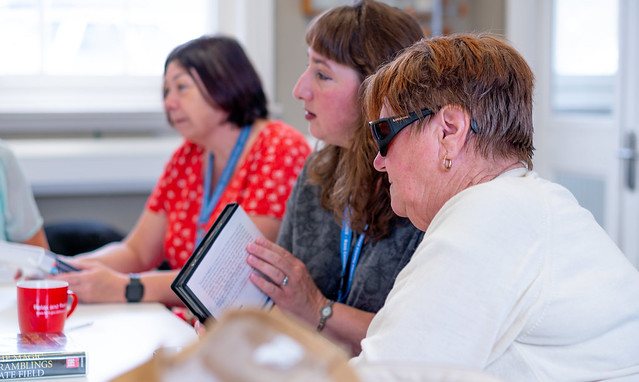October Newsletter 275
Booker Prize
Why the Booker shortlist is more taxing for some readers: “If you want to read the Booker Prize shortlist before the winner is announced on 14 October, the pile of books in hardback will cost you just under £90. But if you are blind or partially sighted and rely on audiobooks, you will pay around 50% more, in part due to the sales tax levied. Publishers are calling for VAT on audiobooks and e-books to be axed. They say it unfairly penalises those who struggle to read traditional books”.
Further details: https://www.bbc.co.uk/news/business-49761460
Sight care for older people
All older people should schedule a regular, dilated comprehensive eye exam with an optician. This exam is the only way many eye diseases are caught early, before vision loss occurs. No matter age or health status, a comprehensive dilated eye exam is important for monitoring eye health and maintaining independence.
Details: https://alextimes.com/2019/09/seniors-optimizing-sight-for-a-lifetime/
Making unavoidable blindness a thing of the past
“The economic burden of sight loss has been estimated at £28.1 billion a year in the UK, yet more than 50 per cent of blindness is avoidable. The All-PartParliamentary Group (APPG) on Eye Health and Visual Impairment reported in June 2018 that sight loss is projected to increase by more than 10 per cent by 2020 and by 40 per cent by 2030.oss all disabilities are improving, sight loss is becoming worse. The major disease causes of blindness – diabetic retinopathy, cataracts, glaucoma, wet age-related macular degeneration (AMD) – are all amenable to treatment if diagnosed early enough”.
Read more: https://www.raconteur.net/healthcare/avoidable-blindness
South London mum using artificial intelligence tech to adjust to suddenly losing her sight
“Sarah Matthews from South East London describes herself as a ‘very visual person’ before she suddenly lost her sight. She studied art and design at university, before going on to work as a freelance illustrator for magazines and newspapers, including the Guardian. However, losing her sight took that all away from her. Sarah says that it was a real struggle adjusting to losing her sight, but that a big focus for her was being able to read again. She started by learning braille and trying various screen readers, as well as listening to podcasts about the assistive technology available to blind and partially sighted people. That is how she heard about the OrCam MyEye 2, a wearable device that uses artificial intelligence technology to read any printed text, as well as recognise faces, products, barcodes, currency notes, and colours”.
Smart cities could give the visually impaired a new outlook on urban life
“Travelling to work, meeting friends for a catch up or just doing some shopping are often taken for granted by people with no known disabilities. For the visually impaired, these seemingly simple things can be a serious challenge. But imagine a city equipped with technology that enables the visually impaired to recognise people, places or even bank notes, helping them to live more independently whether indoors or in a public place. That’s the promise of so-called smart cities, which use things like internet-connected devices and artificial intelligence to improve services and the quality of life for their residents.”
